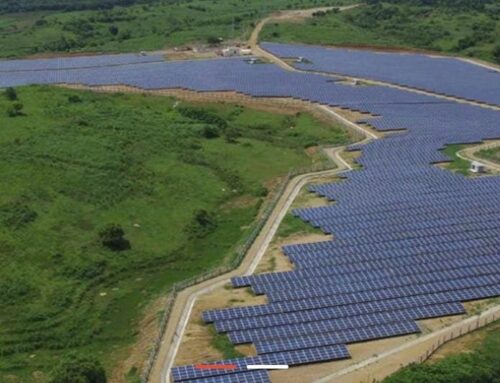Clean energy winners and losers in the Senate’s “Big, Beautiful Bill”
June 20, 2025

The Senate Finance Committee released its portion of the “Big, Beautiful Bill” on Monday, including highly anticipated plans for clean energy tax credits that the House’s version sought to repeal. Here’s what’s better off in the Senate text — which still could change — and what’s not looking so hot.
Winners
Solar and wind — sort of
The House version would require clean power projects to start construction within 60 days of the bill’s passage to access production and investment tax credits introduced under the Inflation Reduction Act. The Senate proposes a more gradual phaseout of credits for solar and wind projects before they terminate entirely at the end of 2027. Certain wind and solar projects would be able to access the tax credits beyond that point, as long as they are at least 1 gigawatt, are on federal land, and have already earned right-of-way approval from the Bureau of Land Management. But as Heatmap notes, those exceptions are unlikely to help any projects already in development.
Utility-scale battery storage
Incentives for energy storage projects would’ve ended just like those for wind and solar under the House bill, but that’s changed in this version. The Senate specifically says battery storage projects can access those production and investment tax credits until 2036, though the value of the incentives will taper over the years.
Geothermal, hydropower, and nuclear
Nuclear power was notably spared in the House’s gutting of clean energy incentives, but it got a few new friends in the Senate iteration. Like battery storage and advanced nuclear, geothermal and hydropower projects will be able to tap 45Y production tax credits until 2036.
Losers
EVs
The $7,500 tax credit for new EV purchases would end about six months after the legislation is signed, while the $4,000 incentive for used EV purchases would end in three. The House extended that rebate for new EVs through 2026 for some emerging automakers, but the Senate didn’t carry over that same exemption.
Home energy improvements
Homeowners would only be able to get tax credits for rooftop solar installations for 180 days after the bill’s passage. Rebates for home energy upgrades, including to help homeowners buy electric heat pumps and other efficient appliances, will also be phased out in 180 days.
Hydrogen
The IRA’s green hydrogen production credit will only be available to projects that start construction this year, and after that, would end immediately. That cut would be brutal for the already-struggling industry, Canary Media’s Julian Spector reports.
What’s next
While the Senate’s proposal steps back some from the House version, tax credits that directly benefit consumers remain the most at risk. And as many experts have warned, those slashed tax credits will put jobs, energy bill savings, and major clean power projects at risk.
Still, these changes aren’t set in stone. Once the whole bill is drafted, the Senate will have to actually pass it, and then reconcile its differences with the House, with an ultimate goal of getting the package on President Donald Trump’s desk by July 4. His signature would start the clock ticking on all those tax credit phaseouts.
Another big energy story
A wave of community solar wins
The skies are cloudy for clean energy, but community solar is still providing some bright spots.
In Delaware, power will soon begin flowing from a 4.7-megawatt array that will help power as many as 750 homes and small businesses. It’s the first of six projects planned across the state to help locals — especially renters and low-income residents — tap into cleaner power, WHYY reports.
More community solar is on the way in the Northeast. A developer broke ground this week on a 3-MW array in Glastonbury, Connecticut, that’s part of a raft of projects across the region. And in New Jersey, lawmakers advanced a bill that would expand the state’s community solar capacity by 50% in an attempt to help curb power bills.
Meanwhile in Minnesota, the preservation of a community solar program will stand as a piece of state Rep. Melissa Hortman’s lasting legacy on clean energy. Hortman, a Democrat who was assassinated in her home last weekend, played a pivotal role in passing the state’s clean electricity standard and updating a community solar program in 2023. More recently, she pushed to keep the repeal of that program out of the state’s energy omnibus bill passed earlier this month.
Clean energy news to know this week
Renewables still win: Renewable electricity is cheaper than power produced by fossil fuels, even without government subsidies, though low gas costs and rising prices for renewables threaten the clean energy buildout, an investment bank’s annual report finds. (E&E News)
Energy research deep freeze: Federal employees say Trump administration funding cuts and freezes are making it impossible for EPA scientists to publish research, for Energy Department employees to visit the agency’s labs, and for other energy and environmental staffers to conduct critical work. (Politico)
Fossil fuels financed: The world’s largest banks increased financing for fossil fuel projects between 2023 and 2024 despite their climate commitments, reversing several years of shrinking financial support for coal, gas, and oil projects. (The Guardian)
Another blow to wind: Anti-wind activists say they’re looking to build on the implosion of a Maine floating offshore wind project as they push the Trump administration to revoke a grant for a similar project in Northern California. (Canary Media)
Pricing out gas: Maryland residents who want new gas service will now have to pay for the connection, as public utilities regulators decide the old system of free or reduced-price hookups is at odds with the state’s climate goals. (Baltimore Sun)
Nuclear goes nationwide: State lawmakers across the U.S. have filed more than 200 bills related to nuclear energy this year, with dozens going into law as states look to meet rising power demand. (E&E News)
read next
Search
RECENT PRESS RELEASES
Related Post



